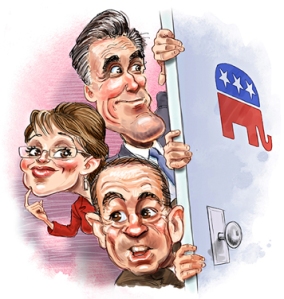I urge members of the Tea Party to actually read this before posting angry responses
Is there anything quite as fickle as public opinion? It’s an unwieldy monster that ebbs and flows with tenacity at the slightest provocation, dangerous not for its volatility, but rather for its ability to substantively change our national agenda. The founders knew this. It’s why they purposefully designed our three branches of government to be almost intolerably deliberative, requiring that everything one branch produces be able to pass litmus tests conducted (very slowly) by the other two branches.
This designed institutional inconvenience was one of the wiser concepts implemented by our Founding Fathers. They knew the potential dangers in getting carried away by our collective emotions. I’m in the business of public relations. No one knows better than I how powerful a motivator public opinion can be.
You often hear people criticize President Obama for his mild manner. Detractors either wish he’d be more assertive and confrontational or believe that his coolness is really just a manifestation of incompetence or indecisiveness. I’m in neither of those camps. On the contrary, I believe that Obama’s propensity to be contemplative and even keeled is actually a shrewd political tactic. It’s a tactic designed to allow him to outlast a political movement that many predicted would see to his political demise. Instead, it was the inability of this movement to remain composed and contemplative that will soon lead to its eventual death; the death of the Tea Party.
Tea was so last year. Time to start a coffee party
The TEA Party, which stands for the Taxed Enough Already Party, is the manifestation of people’s shared anger, confusion and the want for resolve. It was a group founded in response to a single issue: The Great Recession. It has since evolved into another entity entirely that no one can seem to define, including the group itself. Quarrelsome factions exist within its upper ranks because the party was conceived in a rush to judgment, with all of its members wanting a solution to their shared problem, but with nobody knowing exactly how to solve it.
Under the moniker of “Taxed Enough Already,” some within the group have attempted to incorporate divisive social agendas into the party’s platform. This has alienated the previously Independent members by forcing them to align with issues that kept them out of the Republican Party in the first place. There is still a strong contingent of people within the party who only care about reforming our national fiscal policies and balancing the budget. The idea of championing sweeping social reforms that are premised on significant religious undertones does not resonate with these people. As a result, this faction has gradually shied away from the Tea Party label, wishing they’d never renounced their independence from organized political parties.
Roughly one year ago, when things looked bleakest for the Democrats, I remember standing in the kitchen with my father discussing the impact this new Tea Party would have on our politics. Its rise to prominence had turned our conventional understanding of the political spectrum completely on its axis, and no one knew what the end result would be. One thing was for sure: Democrats were scared.
The times, they are a changin
Tea Partiers were calling for a political genocide, which admittedly, they accomplished by effectively voting out some of Washington’s most tenured congressmen. They took the position that the institution of government had been perverted over time, leading a grassroots initiative that resolved to restore integrity to the system.
The differences in how we view the role of government aside, this was a noble, honest endeavor. However, the Tea Party of a year ago is not the same Tea Party that we see today. It hit the same roadblock that every third party inevitably runs into in a system that can only support two legitimate parties, that roadblock being staying power.
The Tea Party gobbled up everyone who was willing to defect from their political loyalties early in its grass roots campaign. The unfortunate thing about a grassroots movement is that it starts out as a movement, an interesting and exciting thing to join, but as time goes on, it becomes an institution. Institutions are much less appealing. So unappealing, in fact, that we’ve limited ourselves to only two of them: the Democratic institution and the Republican institution.
The Tea Party will soon realize that in order to have a lasting impact, it’s going to have to succumb to the same fate as every third party before it. It will have to allow itself to be absorbed into the GOP, hoping that in the best of scenarios, it can move the needle that dictates the Republican Party’s agenda slightly towards the position it aligned itself with on the political spectrum.
Hint: The answer to the poll question is no
Third parties cannot succeed if they target our two biggest parties by contending that they should be considered of equal status. It’s like having a six year old who made his first bologna sandwich last week say to a world class chef “your cooking ain’t so great. You could learn a thing or two from me.”
What role will the Tea Party play in our national history? Honestly, not much of one. It will move the GOP base further to the right once it’s been completely absorbed, the same way the Green Party moved the needle slightly left when it was consumed by the Democratic Party. Sure, it’ll survive– in name, mostly. But it will never again be a real player. Three years from now, no one will be talking about the Tea Party.









